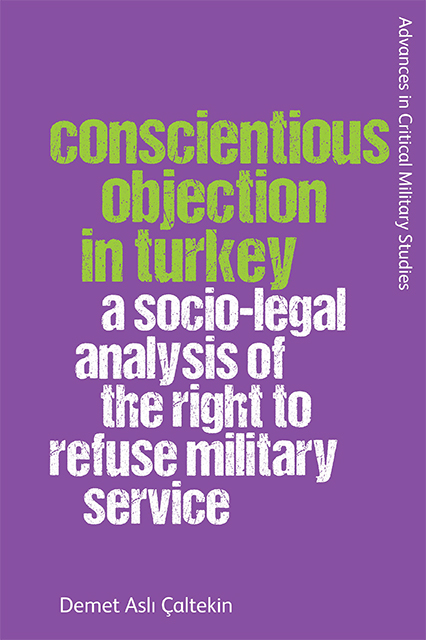Book contents
- Frontmatter
- List of Contents
- Acknowledgements
- List of Legislation
- List of Cases
- List of International Documents
- Setting the Scene: Militarisation of Society
- 1 Conscription and Turkey's Changing Socio-political Structures
- 2 Conscientious Objection and International Law
- 3 The Compatibility of Turkish Domestic Law with International Law
- 4 A Typology of Conscientious Objection in Turkey
- 5 Conscientious Objection as an Act of Civil Disobedience
- 6 Curious Women Conscientious Objectors to Military Service in the Male Conscription System in Turkey
- Conclusion: Demilitarisation of Society
- Bibliography
- Index
2 - Conscientious Objection and International Law
Published online by Cambridge University Press: 14 July 2023
- Frontmatter
- List of Contents
- Acknowledgements
- List of Legislation
- List of Cases
- List of International Documents
- Setting the Scene: Militarisation of Society
- 1 Conscription and Turkey's Changing Socio-political Structures
- 2 Conscientious Objection and International Law
- 3 The Compatibility of Turkish Domestic Law with International Law
- 4 A Typology of Conscientious Objection in Turkey
- 5 Conscientious Objection as an Act of Civil Disobedience
- 6 Curious Women Conscientious Objectors to Military Service in the Male Conscription System in Turkey
- Conclusion: Demilitarisation of Society
- Bibliography
- Index
Summary
Introduction
Conscientious objectors’ personal and moral convictions compel them to disobey the legal obligations that contradict their conscience. Once they have decided that the duty to obey clashes with their moral convictions, they commit the act of civil disobedience. When the law forces people to act against their conscience, such as compelling pacifists to join the military, it is hard to assess the moral convictions that people use to justify their acts of civil disobedience. This is the reason why responses to such a conflict between conscience and law are not well established (Greenawalt 1991: 174). Recent developments show an increased tendency towards recognising the right to conscientious objection at an international level. Yet, conscientious objectors are still exposed to human rights violations, such as discrimination and imprisonment, because of their objection. Some states still ignore the fact that all individuals should be entitled to take responsibility for their own beliefs and not be forced to act against their convictions (Major 2001: 2). As indicated by Matthew Lippman (1990: 65), ‘conscientious objection is a blatant omission from the list of internationally mandated human rights’. Similarly, at the regional level, while the (refined) jurisprudence of the ECtHR indicates that the right to freedom of religion, thought and conscience covers the right to conscientious objection, its implementation differs from one state to another. Conscientious objection is considered as a conflict between states’ interest in securing their territories and their citizens’ right to religion, thought and conscience (Gilbert 2001: 1). In other words, conscientious objectors challenge the duty to protect the homeland against all kinds of threats. As a result, the issue of granting the right to conscientious objection remains controversial (Moskos and Chambers 1993c: 3). Since the implementation of the right to conscientious objection may vary depending on how states interpret human rights, determination of the scope of such a right involves some difficulties. The question of whether all beliefs constitute a legitimate ground for refusing military service remains unanswered (Hammer 2001: 207–8). As indicated by Jeroen Temperman (2010: 211), fair and equal recognition of the right to conscientious objection is not an easy task, requiring multiple human rights issues to be considered.
Given this background, this chapter focuses on the conflict between conscience and law, which raises controversial questions over the responsibility of states in accommodating different forms of moral beliefs.
- Type
- Chapter
- Information
- Conscientious Objection in TurkeyA Socio-legal Analysis of the Right to Refuse Military Service, pp. 31 - 64Publisher: Edinburgh University PressPrint publication year: 2022



